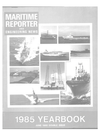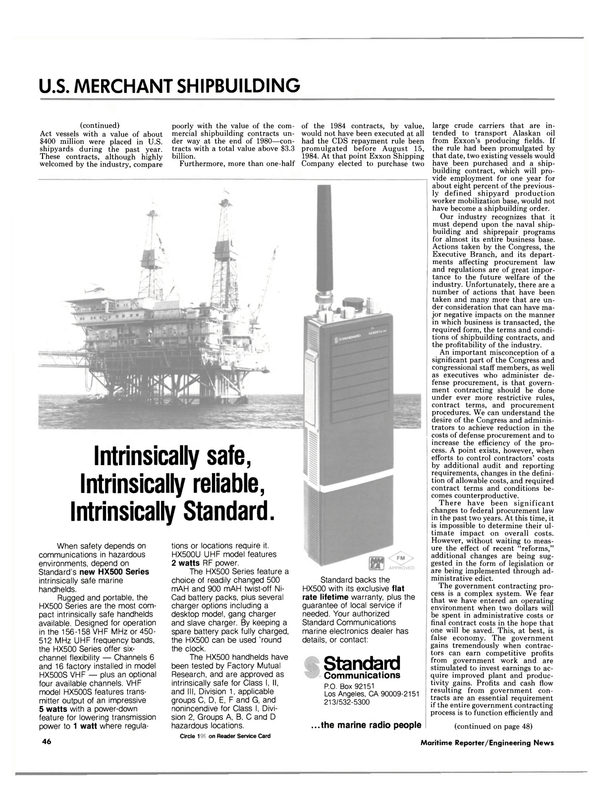
U.S. MARITIME ASSETS AND NATIONAL SECURITY
A MESSAGE FROM THE CHAIRMAN OF THE SHIPBUILDERS COUNCIL OF AMERICA In my message in the 1983 Annual Report of the Shipbuilders Council, I discussed as a major problem the growing divergence between available maritime assets and those required to meet national security demands.
The discussion included consideration of both the number and types of commercial vessels and shipbuilding capacity and capability.
No solution of the problem was identified or implemented during 1984.
The government's most significant action during the year in relation to the issue was the conclusion that a military deployment under Defense Guidance now requires that the size of the Ready Reserve Force must be sharply increased. A year earlier it had been planned to increase the fleet to 77 vessels by 1988. The revised plan envisions that well over 100 vessels will be required to be on 5 to 10 day readiness basis to meet surge deployment demands for dry cargo. The fact that the plan was required to be changed so soon after the original plan was developed indicates that the count and capacity of useful vessels in the privately owned U.S.-flag merchant fleet is changing very rapidly.
And, this change is not in a positive direction. This is in agreement with our predictions and analyses.
A further major increase in the number of product tankers that must be added to the 16 tanker vessels planned to be in the reserve force is predictable when the shortfall in tanker tonnage required to meet wartime demands is factored into strategic planning. In the development of strategic plans, it is readily apparent that the focus of concern has been directed only toward the availability of shipping capacity.
The loss of shipyard capacity has not yet been dealt with, in our judgment.
In spite of assertions and promises given to the Congress in the summer of 1984, that shipbuilding programs would be proposed by early November, the Administration remained silent about the matter throughout the presidential political campaign.
Recently, a maritime spokesman stated that the previous general policy would continue without a shipbuilding program. The policy is paraphrased as follows: • Naval shipbuilding and shiprepair programs provide ample support to the private industry; • The Jones Act, held sacrosanct, will provide some work for the industry; • Present cargo reservations programs will be continued but not extended; • No programs that involve spending beyond the defense programs will be considered; and • Other than Jones Act vessels, U.S.-flag ships must be acquired abroad.
Thus, the shipbuilding industry must be content with being essentially a captive supplier to the Navy, dependent on only the naval and the predicted small Jones Act markets.
The assertions of our industry that a balanced maritime program, providing support for shipbuilding consistent with the demands of the national security, has again been rejected without adequate consideration of the consequences.
A tenet of present maritime policy is that offshore procurement of all foreign-trading vessels is essential to the national welfare. It follows, therefore, that shipbuilders are expected to desist in arguments for a balanced maritime program, drop opposition to foreign building for ship operators, and accept the fate that results as a consequence.
The owners of the nation's shipbuilding and repair companies expect more from the managers to whom they have entrusted their investments than this policy would provide. Surely, the nation's citizens expect more than silent acceptance of national policy that we sincerely hold as incorrect. Our international allies should, and do, expect more, as their own security depends upon our nation's ability to perform in accord with our claims of military capability.
The shipyards of the nation have made great strides in the past few years to increase capability and efficiency.
The government has been the principal beneficiary of these improvements. Major cost reduction in the procurement of naval ships has occurred. However, we cannot perform miracles. We cannot become internationally competitive in the commercial shipbuilding arena for a number of reasons, of which not the least is the magnitude of government support our competitors receive. The U.S. government by its choice has become our principal customer. Its decisions as to the extent it will support our industry will determine the reality of our defense capabilities.
Read U.S. MARITIME ASSETS AND NATIONAL SECURITY in Pdf, Flash or Html5 edition of June 1985 Maritime Reporter
Other stories from June 1985 issue
Content
- McDermott Gets Contract From SOHIO To Build Offshore Drilling Platform page: 6
- Shipboard Safety Criteria Monitored By Siemens Computer page: 6
- Puroflow Gets Canadian Order For Ultraviolet Water Purification Systems page: 6
- Moss Point Marine To Build Victorian-Style Sternwheel Riverboat page: 7
- Fiberglass Passenger Vessel Built By Westport For Catalina Channel page: 8
- New Facility Opened By Lips Propellers At Todd-Seattle Shipyard page: 9
- Samson Offers Brochure On Passive Mooring Systems For Supply Vessels page: 9
- Marathon LeTourneau To Construct World's Largest Bottom Supported Mobile Offshore Drilling Unit page: 12
- GEC Rolls-Royce Gensets Selected For Shell/Esso Tern Offshore Platform page: 14
- A S S C O Elects B a u m l e r V P - M a r k e t i ng page: 15
- N e w B r o c h u r e F r om W e s t i n g h o u s e Discusses C o m b u s t i o n T r i m C o n t r ol page: 15
- Raytheon Introduces JRC Color And Digital Rasterscan Radar Unit page: 16
- Simpson Timber Restructuring Its Panel Products Division page: 16
- Ingersoll-Rand Signs Sales Agreement With Kawasaki page: 17
- Murray Grainger Resumes Business Activities As Used Equipment Dealer page: 20
- New Remote Control VHF Marine Radio Introduced By Uniden page: 20
- Mitsubishi Introduces Latest Diesel Engine At New York Seminar page: 21
- Contract For Wharf At Cow Head Oil Rig Servicing Facility Awarded page: 22
- Marathon LeTourneau Exhibits Slo-Rol® Motion Suppression Technology During 1985 OTC page: 23
- Aluminum Boats Delivers Whale Watch Excursion Boat page: 23
- I.T.C. Holland Engineers Its Third Double Rig Dry Transport On The Sibig Venture page: 25
- Hitachi Zosen Completes Two Power Generating Barges For Philippines page: 25
- FUTURE U.S. NAVY BUSINESS OPPORTUNITIES —A $230 billion # 5 Year Market— page: 26
- US SHIPBUILDING OUTLOOK Markets & Cost Saving page: 44
- Secretary Dole Promulgates CDS Repayment Rule page: 44
- U.S. MARITIME ASSETS AND NATIONAL SECURITY page: 48
- THE CIRCLE OF RELIANCE " I n Time of War, Land, Sea, and Air Forces and All Logistic Support Functions Must Work as a Team" page: 50
- THE GOVERNMENT AS PARENT TO INDUSTRY: PARTICIPATION OR BENIGN NEGLECT? page: 52
- A SUCCESSFUL MARITIME POLICY UNDER ATTACK page: 58
- Offshore Service Vessels, Tugboat And Inland Towboat Fleets page: 60
- U.S. COULD LEARN A LESSON FROM GREAT BRITAIN'S OFFSHORE OIL LEASING page: 65
- CANADIAN SHIPBUILDING — 1985 — page: 76
- Liu Elected Vice President Of American Bureau To Head R&D Division page: 79
- VTHE NEW DDG-51 CLASS GUIDED MISSILE DESTROYERS —A Report— page: 80
- Harris Gets Subcontract To Supply HF Equipment For Canadian Frigate Program page: 89
- Brochure On "Sea Float" Marine Buoys And Floats Offered By Seaward page: 89
- Multi-Purpose Freighters To Be Built By Seebeck page: 89
- Omnipure Awarded $1.3-Million Contract From Canadian Navy page: 90
- New IMA Report On Future U.S. Navy Procurement Now Available page: 90
- Dubai Drydocks Reports Profit For Second Year page: 91
- Farboil Offers Free Four-Color Folder On Wetsall® Coatings page: 91
- Devoe Offers Brochure On Marine And Corrosion Control Paints & Coatings page: 92
- New Portable Hoists Line With Failsafe Brakes Now Available From PHD page: 92
- World Transport Coordinates Wet Tow Of Western Oceanic Rig page: 93
- Marinette Marine Installs First DWB Ship Transfer System In North America page: 93
- Norcontrol Offers Brochures On Navigation/Instrumentation Line Marketed In U.S. By Nav-Control page: 94
- Nichols Brothers Builds New McNeil Island Ferry page: 97
- Rowan Offers Free Literature On Drill Rig 'Rowan Gorilla IV' page: 97
- Raytheon Introduces Newest SatCom For Fishing And Pleasure Craft page: 98
- Crawford Fitting Introduces Gap Inspection Gages For SWAGELOK Tube Fittings page: 98
- Jeffboat Delivers Deck Barge For Nugent Sand Company page: 99
- Unique Actuator Selection Slide Chart Available From Jamesbury Corp. page: 99
- CRUISE '85 SHIPS • OPERATIONS • SERVICES page: 100
- Aeroquip T-J Division Offers New Series TP Proximity Switches page: 101
- Valcor Catalog Includes Products For Marine And Naval Applications page: 102
- Apelco Introduces Loudhailer With Two-Way Intercom And Alarm Features page: 102
- Marine Management Develops Demo Programs page: 103
- Marco-Seattle Converts Two Combination Crabbers For New Fishery Roles page: 103
- Markey Supplies Tug With Two Capstans page: 104
- Southwest Marine Yard Repowering San Francisco Commuter Ferries With Detroit Diesel Allison Engines page: 104
- AMETEK Announces Computerized Inspection Management System page: 105
- "Marine Library" Literature Available From DDA page: 105
- Furuno Introduces FR-803D Digital Radar page: 105
- MariChem 85 page: 106
- LIQUID CARGO HANDLING EQUIPMENT —A Review— page: 108
- Marathon LeTourneau GranGulf™ Semi Design Offers Economic Construction & Optimum Deck Load page: 113
- First Interactive Shiphandling Simulators From Ship Analytics Being Commissioned page: 116
- Stewart & Stevenson 'Mean 16' Provides Patrol Boats With New Power And Cruising Range page: 119
- Literature Available On Navlink From Datamarine page: 119
- Elliott White Gill Names New Sales Agent For Taiwan page: 120
- Blackinton Named General Manager Of Bethlehem-Beaumont Yard page: 120
- DAMPA Continuous Ceiling Approved By U.S. Navy— page: 121
- Ingersoll-Rand Forms New Compressors Division page: 122
- Menge Named Agent For Seaward Fenders page: 122
- Lanzendorfer Will Manage Fairbanks Morse Service Facility in San Diego page: 124
- $5.3-Million Navy Program Received By Tracor page: 124
- Gensler Named Director Of Marketing And Sales For InterTrade Industries page: 124
- WABCO Offers 8-page Brochure On Logicmaster™ Marine Propulsion Control Systems page: 133
- Free 12-Page Color Brochure Availale From Falk On New Shaft Speed Reducer Line page: 133


